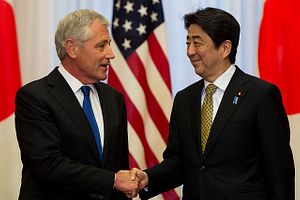As my colleague Clint noted here on the Tokyo Report last week, Tokyo has been “eerily” silent on the issue of collective self-defense ever since Japanese Prime Minister Shinzo Abe’s Cabinet boldly reinterpreted Article 9 of the Japanese constitution, establishing a right to engage Japanese military forces in the defense of another country. Turns out, that silence will be broken shortly as Japan and the United States will release a joint interim report on a planned revision of their bilateral defense cooperation guidelines on Wednesday. The report was originally scheduled for late September but was delayed in order to better refine the wording, according to a report by Kyodo News.
The interim report will likely clarify what the collective self-defense reinterpretation means for bilateral defense scenarios such as Japanese Maritime Self-Defense Forces (JMSDF) ships’ ability to defend U.S. ships in international waters, and Japan’s ability to intercept ballistic missiles. The report is also expected to emphasize Japan’s “exclusively defense-oriented” policy. Ever since the collective self-defense reinterpretation this summer, Abe has been keen to revise the guidelines with the United States to give shape to his administration’s plans for a more “proactive” security policy. Abe has described his vision for Japan’s security policy in the region as “proactive pacifism.”
Naturally, not all of Japan’s neighbors are convinced by Abe’s assertion that his vision is pacifistic. Notably, China and South Korea, two countries with painful memories of Japanese imperialism and militarism in the early and mid-20th century, remain skeptical of the decision to reinterpret the constitution. Accordingly, in a somewhat atypical move, U.S. and Japanese officials will brief South Korean officials ahead of the report’s release this week. South Korea, like Japan, is an important U.S. treaty ally. According to The Yomiuri Shimbun, U.S. Assistant Secretary of Defense for Asian and Pacific Security Affairs David Shear will visit Seoul to brief South Korean officials.
The extent of the new bilateral guidelines could be expansive. According to sources close to the matter who spoke with Japan’s Asahi Shimbun, the guidelines could effectively allow Japanese armed forces to operate with the United States military in a support capacity anywhere in the world. Traditionally, with a few exceptions, Japan’s armed forces have operated exclusively on Japanese soil and in Japan’s immediate vicinity. Under the current bilateral defense cooperation guidelines, U.S. and Japanese forces can cooperate under three conditions: “normal” conditions, an attack against Japan, and certain situations in Japan’s immediate vicinity.
The interim report expected on Wednesday will be followed up by a final bilateral report. That report is expected before the end of the year.

































